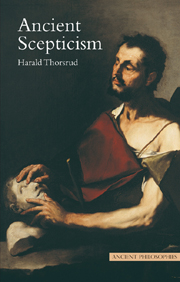Book contents
- Frontmatter
- Contents
- Preface
- Sources and abbreviations
- Chronology
- 1 Introduction
- 2 Pyrrho and Timon: the origin of Pyrrhonian Scepticism
- 3 Arcesilaus: the origin of Academic Scepticism
- 4 Carneades
- 5 Cicero: the end of the sceptical Academy
- 6 Aenesidemus: the Pyrrhonian revival
- 7 Sextus Empiricus: the consistency of Pyrrhonian Scepticism
- 8 Pyrrhonian arguments
- 9 The (ordinary) life of a Pyrrhonist
- Notes
- Guide to further reading
- References
- Index of passages
- Index
4 - Carneades
- Frontmatter
- Contents
- Preface
- Sources and abbreviations
- Chronology
- 1 Introduction
- 2 Pyrrho and Timon: the origin of Pyrrhonian Scepticism
- 3 Arcesilaus: the origin of Academic Scepticism
- 4 Carneades
- 5 Cicero: the end of the sceptical Academy
- 6 Aenesidemus: the Pyrrhonian revival
- 7 Sextus Empiricus: the consistency of Pyrrhonian Scepticism
- 8 Pyrrhonian arguments
- 9 The (ordinary) life of a Pyrrhonist
- Notes
- Guide to further reading
- References
- Index of passages
- Index
Summary
None of Arcesilaus' first three successors (Lacydes, Evandrus and Hegesinus) are credited with any noteworthy achievements: they merely continue Arcesilaus' practice. Carneades, by contrast, surpasses even Arcesilaus in his rhetorical and philosophical brilliance. Accordingly, he invites an even greater measure of criticism:
this man also would bring forward and take back, and gather to the battle contradictions and subtle twists in various ways, and be full both of denials and affirmations, and contradictions on both sides: and if ever there was need of marvelous statements, he would rise up as violent as a river in flood, overflowing with rapid stream everything on this side and on that, and would fall upon his hearers and drag them along with him in a tumult … The evil results therefore were the more numerous [than Arcesilaus']. And nevertheless Carneades fascinated and enslaved men's souls … In fact every opinion of Carneades was victorious, and never any other, since those with whom he was at war were less powerful as speakers.
(Praep. Ev. 14.8.2, 9–10)Carneades' persuasiveness only serves to accomplish greater evil if we assume that he leads people away from true, or at least beneficial, beliefs. The pressing question is: what did he hope to achieve? It is uncharitable to assume that he was malicious. But it is easy to see how he might have appeared so.
Both Socrates (Ap. 23c) and Arcesilaus (DL 4.37) had attracted a large following by publicly deflating the intellectual pretensions of prominent people.
- Type
- Chapter
- Information
- Ancient Scepticism , pp. 59 - 83Publisher: Acumen PublishingPrint publication year: 2008

